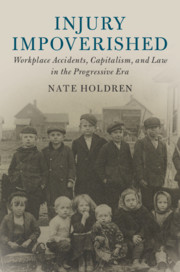Book contents
- Injury Impoverished
- Cambridge Historical Studies in American Law and Society
- Injury Impoverished
- Copyright page
- Epigraph
- Contents
- Tables
- Acknowledgments
- Introduction
- Part I The Eclipse of Recognition and the Rise of the Tyranny of the Table
- 1 Commodification and Recognition within the Tyranny of the Trial
- 2 Injury Impoverished
- 3 Suffering and the Price of Life and Limb
- Interlude
- Part II New Machineries of Injustice
- Conclusion
- Coda
- Index
3 - Suffering and the Price of Life and Limb
from Part I - The Eclipse of Recognition and the Rise of the Tyranny of the Table
Published online by Cambridge University Press: 06 April 2020
- Injury Impoverished
- Cambridge Historical Studies in American Law and Society
- Injury Impoverished
- Copyright page
- Epigraph
- Contents
- Tables
- Acknowledgments
- Introduction
- Part I The Eclipse of Recognition and the Rise of the Tyranny of the Table
- 1 Commodification and Recognition within the Tyranny of the Trial
- 2 Injury Impoverished
- 3 Suffering and the Price of Life and Limb
- Interlude
- Part II New Machineries of Injustice
- Conclusion
- Coda
- Index
Summary
Chapter 3 turns to less laudable voices and reasons for employee injury law reform. The chapter focuses on reformers who argued for reform on the grounds of macro-economic concerns and concerns for social stability, such as the claim that employee injury would reduce the profitability or efficiency of the US economy as a whole. Those arguments existed alongside claims that compensation laws would benefit employers because the court-based system of employee injury law was unnecessarily expensive. The chapter explains the political economy of the large corporation that made compensation laws appealing to some employers. These kinds of concerns had little to do with the well-being of injured people and their families, treating them instead as economic objects for use. That economic treatment of working-class people dovetailed with the distributive emphasis of social justice reformers. That combination of approaches shaped compensation laws such that the personal and dignitary elements of injury that were presentable under the court-based system of employee injury law would no longer have any place in the law.
Keywords
- Type
- Chapter
- Information
- Injury ImpoverishedWorkplace Accidents, Capitalism, and Law in the Progressive Era, pp. 84 - 118Publisher: Cambridge University PressPrint publication year: 2020



